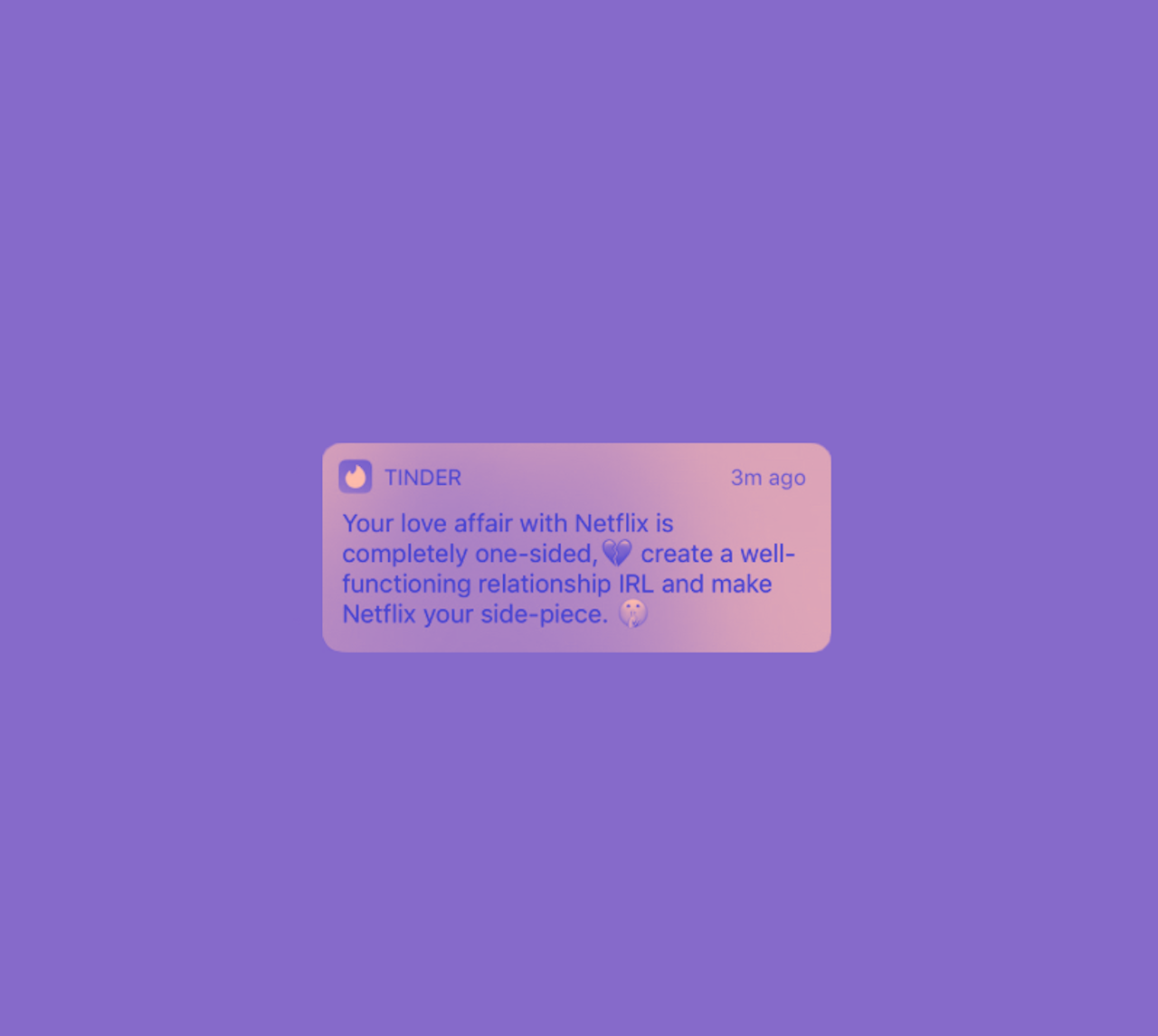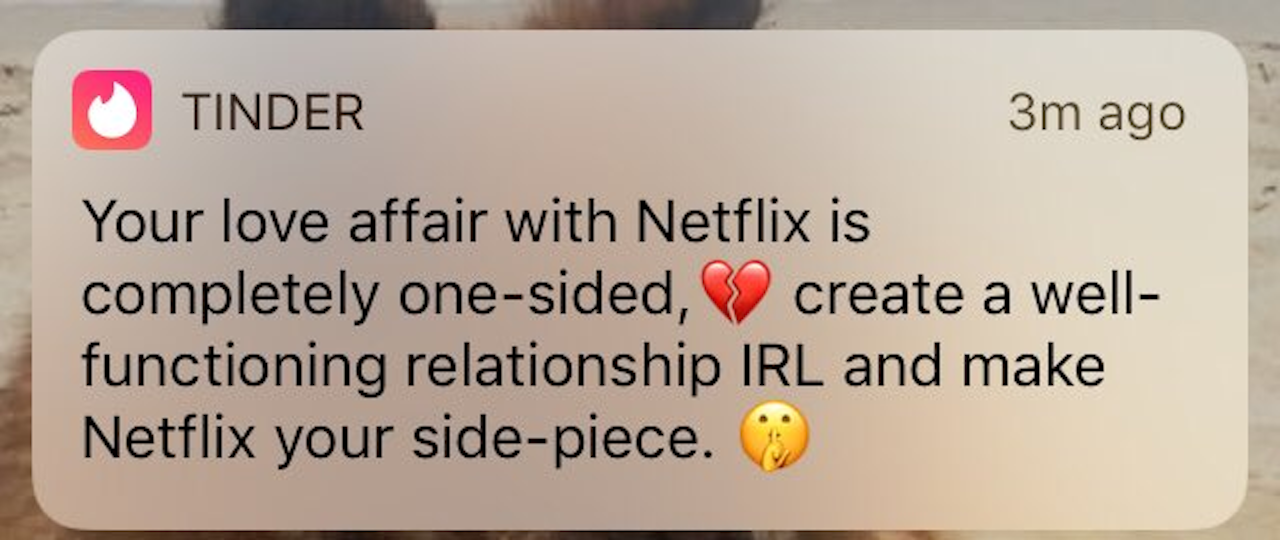When you’re an online dating veteran like me, you start to think that true love might be a sham. While mindlessly swiping through my stack of Los Angeles bachelors with their endless Museum of Ice Cream sprinkle pool parties, I find myself making snap judgements about men I’ll probably never meet: is he emotionally unavailable, a closet alt-righter, or a false feminist ally? When someone does catch my eye, that numbness turns into a hesitant excitement. I hold my breath, waiting for the screen to place our profile photos together. Most of the time, we aren’t a match, but that brief adrenaline rush keeps me glued to the app.
Recently, during a binge session of Netflix’s Queer Eye reboot, I felt my phone vibrate. I was desperately in need of a little confidence boost, so I was hoping it would be a new match. Instead, it was a push notification from Tinder: “Your love affair with Netflix is completely one-sided, 💔 create a well-functioning relationship IRL and make Netflix your side-piece.”
I flinched. How did Tinder know I had just watched three episodes of Queer Eye in a row? Was this some sort of cross-promotional advertisement for Netflix? And why was Tinder insinuating that most of my past relationships had been dysfunctional?
I texted my friends to see if they’d received anything similar. One had also been scorched by a different cynical quip: “Burned all your bridges and finding yourself friendless and dateless? 😧 Don’t worry, there are literally millions of bridges to be destroyed on Tinder 😎 😚.” Another had a received a similar notification from Bumble, worded in a manner that seemed consistent with the platform’s feminist-empowerment bent. “Even on your worst days, there is someone out there that is proud of you. We are too 💛.”
The notifications left me unsettled and confused. Why were these apps acting like a life coach all of a sudden?
I decided to contact Tinder and Bumble. Tinder didn’t respond to my email, so I’ll never know if they’re tracking my Netflix habits. Jessica Collins, Product Marketing Manager at Bumble, replied. “One of the things that’s important at Bumble is acknowledging the importance that relationships have on your life — and that includes the relationship you have with yourself,” she wrote, when I asked her why Bumble was sending users reminder to practice self-care and positive thinking. “Having a healthy self-esteem is a prerequisite to forming ANY healthy relationship...whether it’s romantic, friendship, or professional.” She also assured me that the copy Bumble used for its notifications represented original content from the brand — not advertisements.
The irony about these digital pep-talks is that dating apps probably aren’t the best thing for your mental health. A recent study by researchers at the University of North Texas correlated Tinder use with negative body image and low self-esteem in male and female participants alike — and in a 2016 survey by Consumer Research, more than half of women and nearly a quarter of men reported feelings of harassment while using these platforms. Dating apps are also remarkably addictive. In an article for The Conversation, Jeanette Purvis, PhD student in psychology at the University of Hawai, explained that “Because users don’t know which swipe will bring the ‘reward’ of a match, Tinder uses a variable-ratio reward schedule, which means that potential matches will be randomly dispersed.” According to Purvis, it’s the same reward system that gets people hooked on slot machines and video games.
Given this state of affairs, it’s tempting to read Tinder and Bumble’s notifications as an attempt to inject some humor and playfulness into the online dating grind. After receiving another gem from Tinder — What’s the best way to get revenge on a ‘ghoster’? 🤔 To have a great time with someone new, duh 🙄 Start swiping! — I started thinking about how the notifications Tinder and Bumble were sending represented two very distinct schools of dating app therapy, consistent with the product they are selling. While Tinder swears its primary function is helping strangers connect, Bumble founder Whitney Wolfe Herd, a Tinder co-founder who sued a former colleague at the company for sexual harassment, has said her mission was to design a dating experience that helps women feel safer.
Tinder is your edgy, perpetually vaping bro co-worker who goads you to action by joking around in ways that pinpoint your insecurities. He knows that online dating is a form of psychological warfare and wants you to keep fighting through setbacks, but he’s not exactly helping you stay confident or sane. Bumble, on the other hand, is your sweet, well-meaning high school friend with a “Live, Laugh, Love” wall decal in her living room. She encourages you to put yourself first, practice self-care, and swipe with an open mind. She understands how draining the dating game is and wants you to take a break — as long as you come back to the app.
However different these strategies appear on the surface, both conflict with the reason why a lot of us use dating apps: to meet someone you want to spend time with IRL and get the hell off. But Tinder and Bumble are businesses, and they can’t afford to lose a user every time she meets The One. Recently, Bumble introduced BFF, a best friend finder, and Bumble Bizz, a professional networking tool, effectively manufacturing an endless cycle of swiping for every aspect of your life.
The trouble with these bite-sized therapy sessions is that they obscure this state of affairs, positioning these apps as a sympathetic counselor rather than the engineer of a miserable purgatory. When I contacted Bumble over email, I asked Collins to describe the typical user of the app. “We picture our users as kind, empowered, inclusive and willing to make the first move,” she replied. That’s all well and good, but if their community is so confident and empowered, then why do they need a perpetual feed of inspirational messages like “Friendly reminder: keep doing YOU. You’re doing amazing 💛”? Messages like these dance around the possibility of dissatisfied users without acknowledging the source of the problem: that dating apps have a lot of power over the people who rely on them for human connection, including the power to us feel lonely and depressed.
But admitting to that power would mean confronting the moral responsibility these dating apps have toward their users, and perhaps retooling their products to prioritize mental health. There have been some signs of progress—In 2017, Tinder launched their “Menprovement Project,” which enables female users of the app to respond to harassers with a host of shade-throwing animations called “Reactions.” Bumble, which claims it has one of the lowest rates of reported harassment in the dating app ecosystem, has tried to further its safe environment by banning misogynistic language, shirtless selfies, and, more recently, photos that include guns.
While these are important steps to building a better experience, reducing these apps’ psychological toll on users may necessitate a more substantial pivot. Instead of trying to act like a life coach, I’d argue that Tinder and Bumble would be better off emphasizing their subscription services, which help members bypass swiping entirely. Tinder Gold and VIBee streamline the matchmaking process by allowing users to see who has already swiped right on them, reducing the frustration that comes from swiping into the void. But prioritizing these features could mean sacrificing the addictive qualities that make their platforms so enticing — to users and advertisers alike.
The most obvious way to shake myself out of my Tinder-triggered gloom would be to turn off notifications, or delete the app entirely. I’ve done it a couple times, but I always come back. What if I miss out on the guy of my dreams? Surely there’s another disillusioned millennial out there swiping complacently and being app-shamed for his Netflix habits. Maybe we’ll meet up at Center for Land Use Interpretation one day, and we’ll see the see the mutual disenchantment in each other’s eyes. I long for that, so I sigh and swipe “view” on my Tinder notification, hoping it’s the last one I’ll ever endure.






